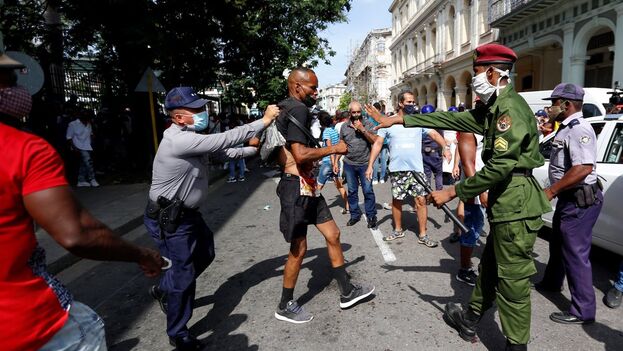
![]() 14ymedio, Yoani Sanchez, Havana, 10 December 2021 — Whatever happened to that student who vehemently justified the act of repudiation against activists in a Lawton park on 10 December 1998? For a week, that teenager and her fierce classmates were portrayed as the young face of revolutionary intransigence and even bragged about breaking a camera belonging to the foreign press.
14ymedio, Yoani Sanchez, Havana, 10 December 2021 — Whatever happened to that student who vehemently justified the act of repudiation against activists in a Lawton park on 10 December 1998? For a week, that teenager and her fierce classmates were portrayed as the young face of revolutionary intransigence and even bragged about breaking a camera belonging to the foreign press.
Almost a quarter of a century later, probably many of those who participated in that repressive day have already emigrated, or have become disillusioned with the system, or are currently surviving thanks to corrupt practices. But the regime that used them as shock troops remains willing to take over Human Rights Day, to not allow public demands from citizens, and to violently crush those who dare to take to the streets to demand freedom for political prisoners.
Authoritarian regimes know that they can always find people willing to attack others, they are skilled in handling base human passions, but the truth is that the reluctance of Cubans to respond to official calls to “confront the enemy” is noticeable. Although there are some who pose for photos with a club in hand or pretend to shoot an opponent without even knowing how to position the rifle, the vast majority avoid becoming involved in the oppressive machinery.
If a few decades ago that girl dressed in her school uniform strutted on television about having disbanded an opposition march with screams and blows, today her children could be among those who are dragging their feet when they are taken from school to a “false fair,” in a park where previously a call was launched to protest the lack of freedoms. Her enthusiasm was cooled by reality; their apathy is a form of rebellion.
Despite the little impetus of its followers, officialdom continues to deploy its old propaganda and police machinery on this day that commemorates the approval of the Universal Declaration of Human Rights, in the now distant year 1948. The approach ranges from trying to appropriate the concept by flooding the press with the supposed social achievements of the system and hijacking the hashtags on social networks, to the crudest practices of arrest, hate rallies, and cutting off the phone lines of opponents.
But the almanac has become a problem for Castroism. If before it had to concentrate its greater efforts of surveillance and control around the day of human rights, now it has dates all over the place. The popular protests of July 11 showed that Cubans have been gaining in civic awareness to the same extent that they have also accumulated social unrest. The militarization to prevent the Civic March of November 15 added another mark to the calendar.
The Plaza of the Revolution has to live each day with the same shock provoked on this December Day a few years ago. In each of the 24 hours, from sunrise to sunset, it is permanently engaging in the exhausting strategy of stifling focal points of disagreement, avoiding riots, frightening potential protesters, convincing allies that the Communist Party has an eternity ahead of it at the helm of the nation, diverting resources from the national budget to strengthen its political police and praying… yes, praying, that people do not take to the streets again.
____________
COLLABORATE WITH OUR WORK: The 14ymedio team is committed to practicing serious journalism that reflects Cuba’s reality in all its depth. Thank you for joining us on this long journey. We invite you to continue supporting us by becoming a member of 14ymedio now. Together we can continue transforming journalism in Cuba.
